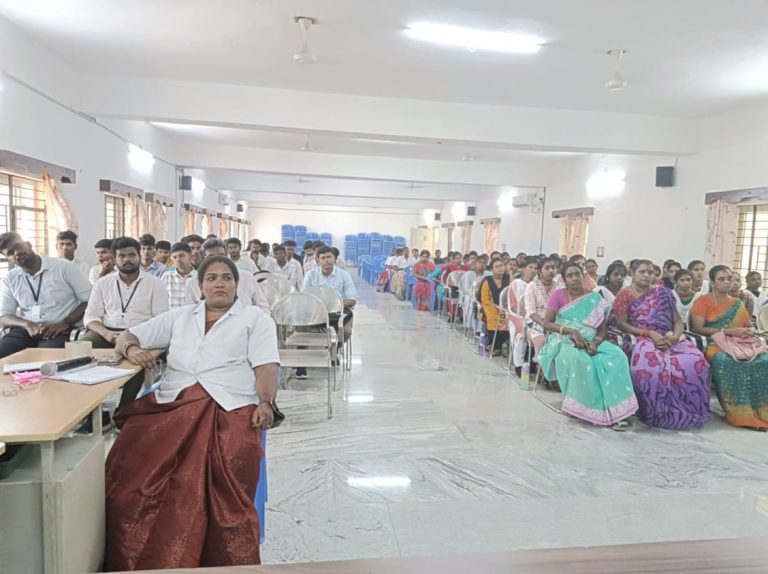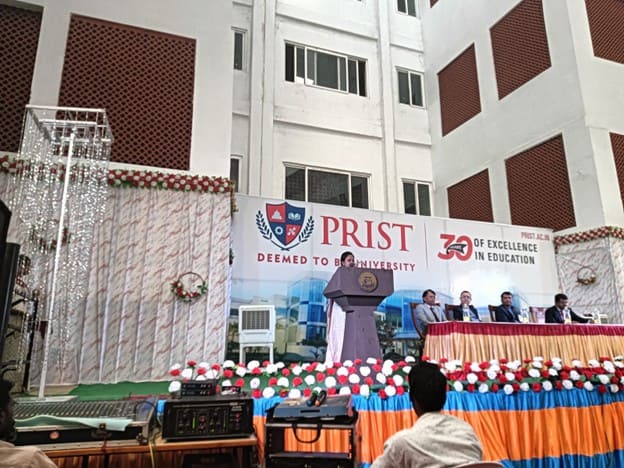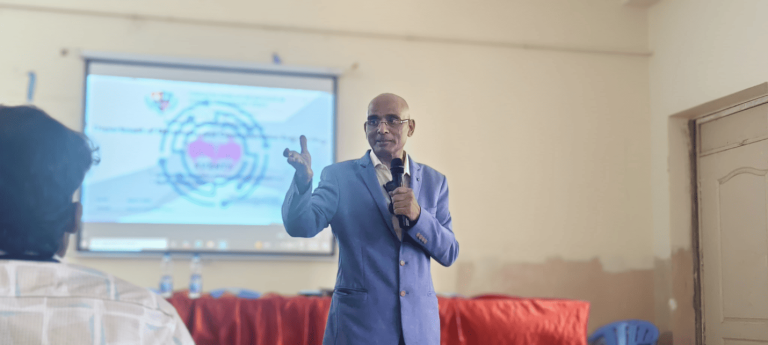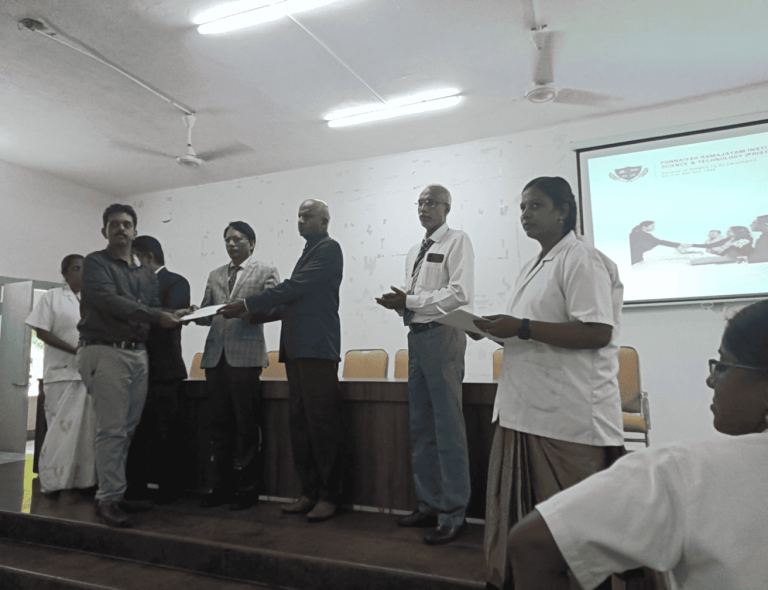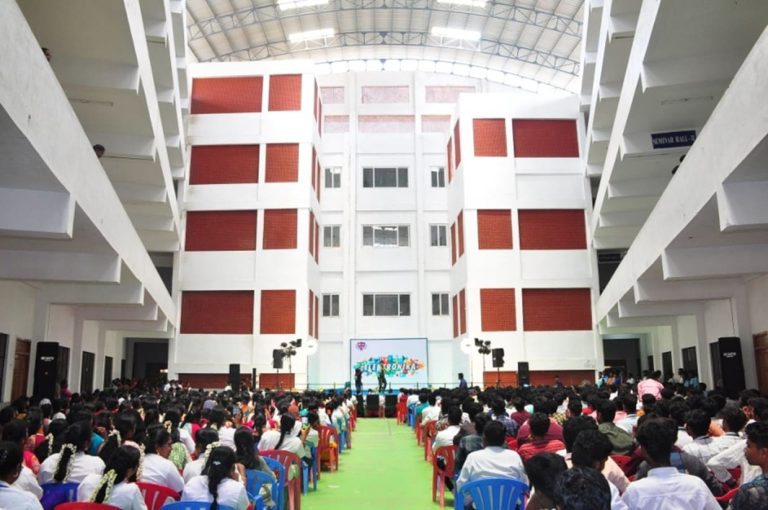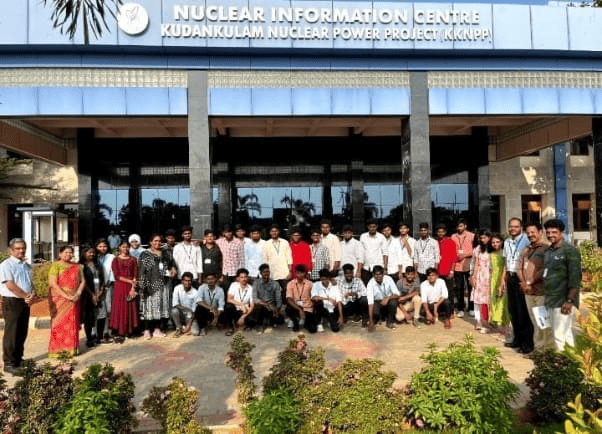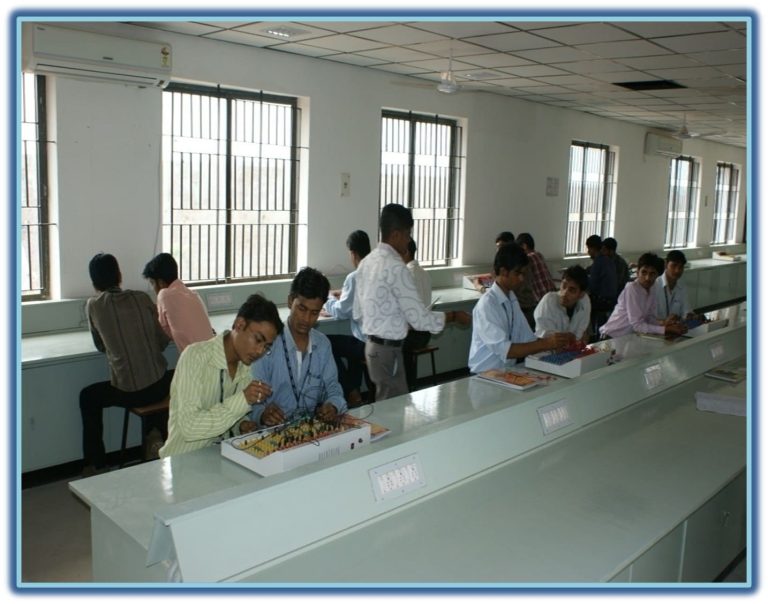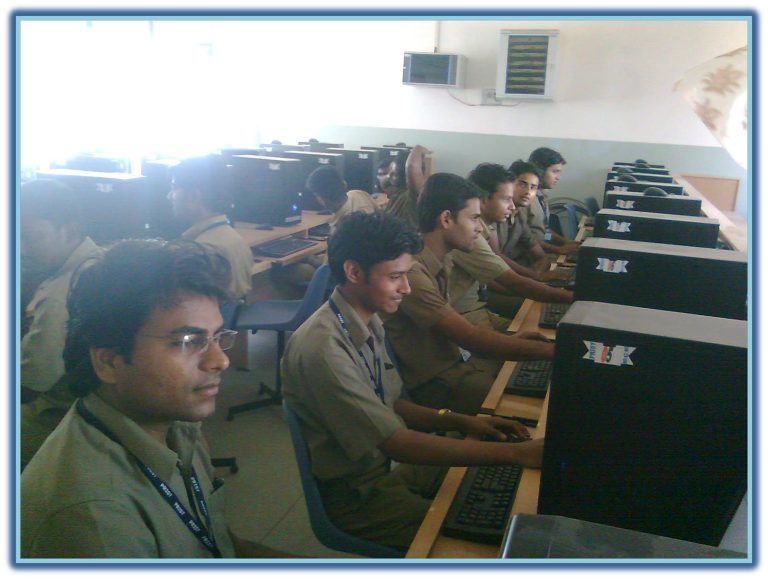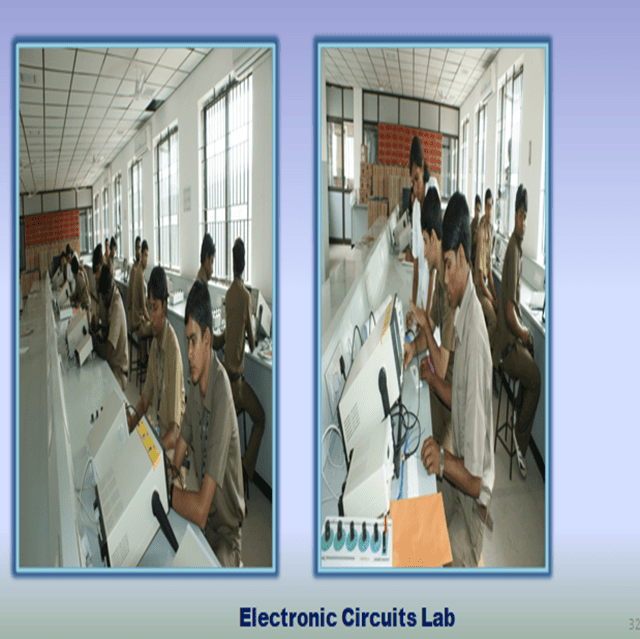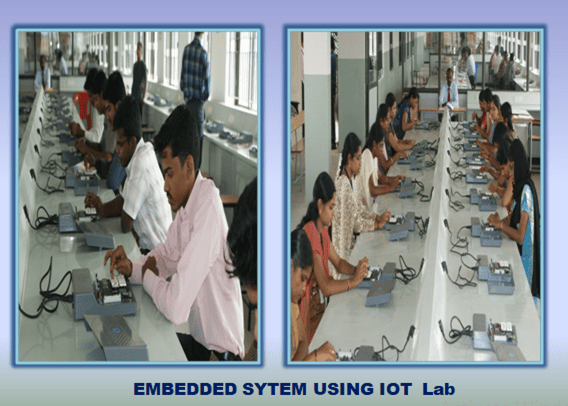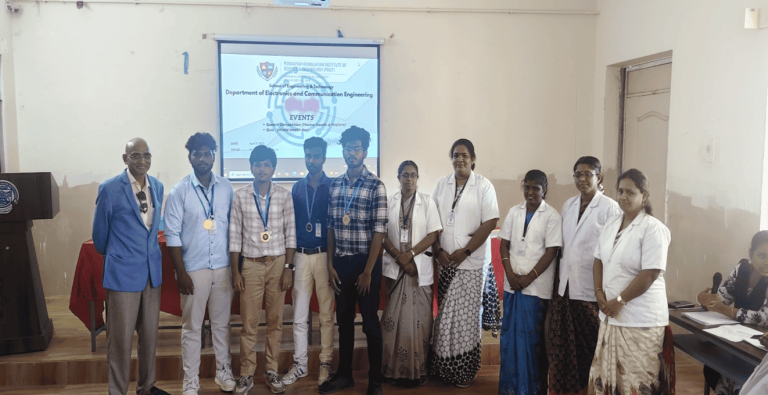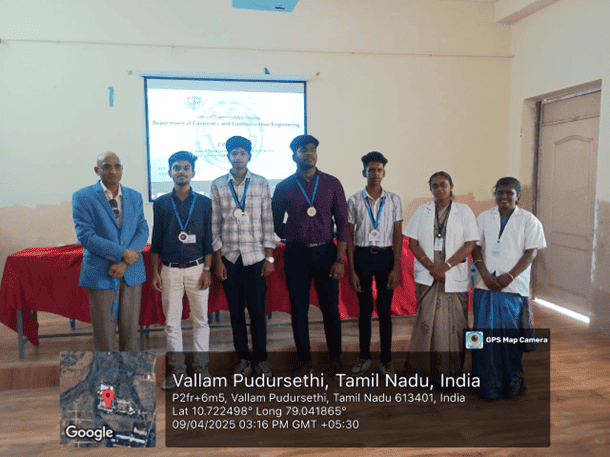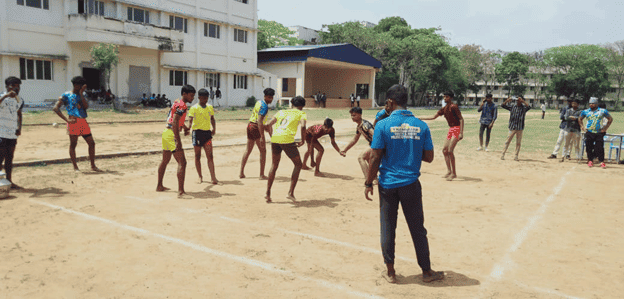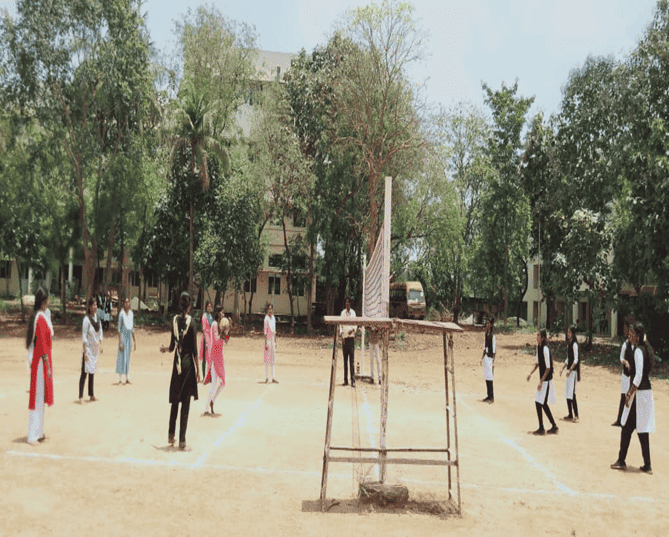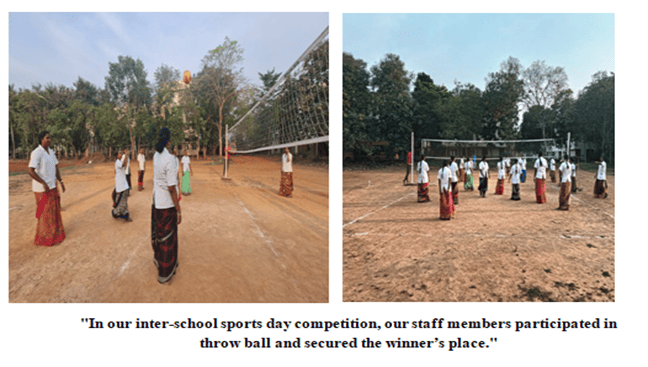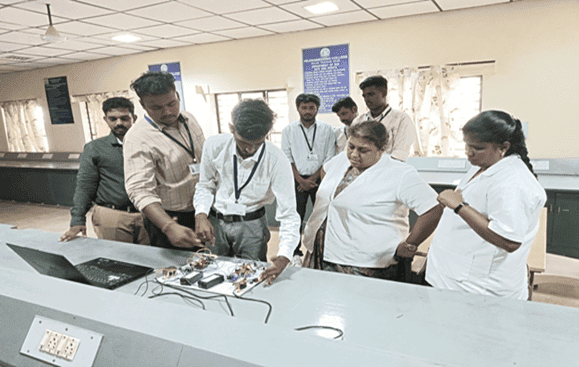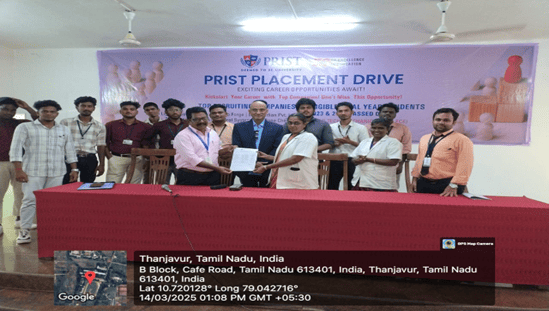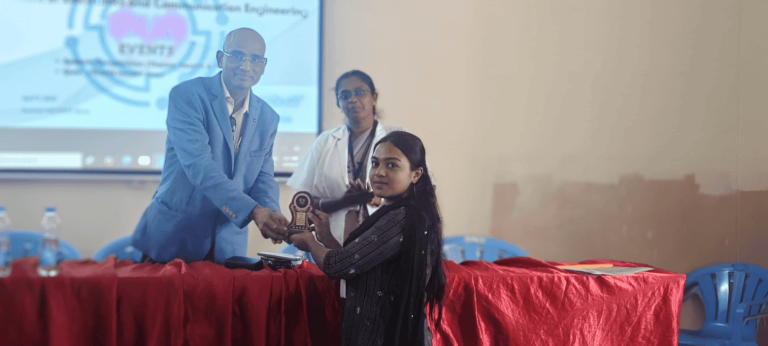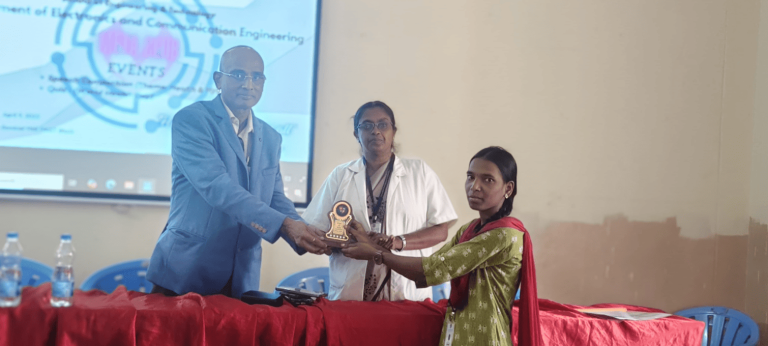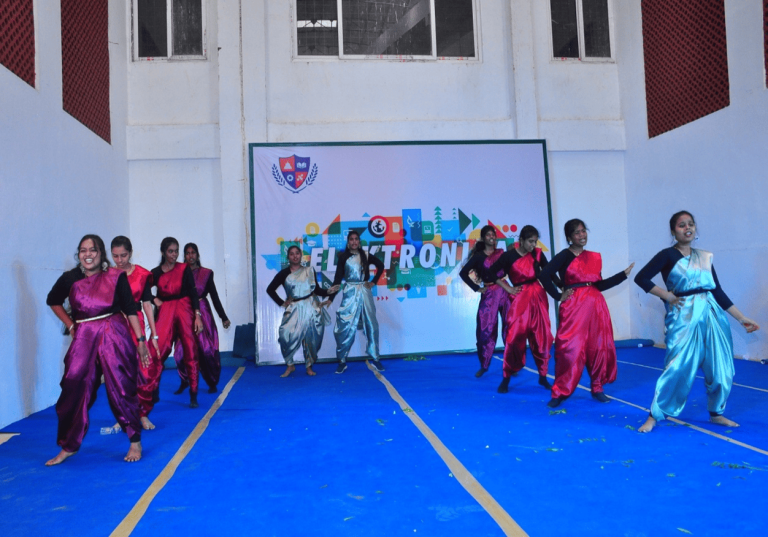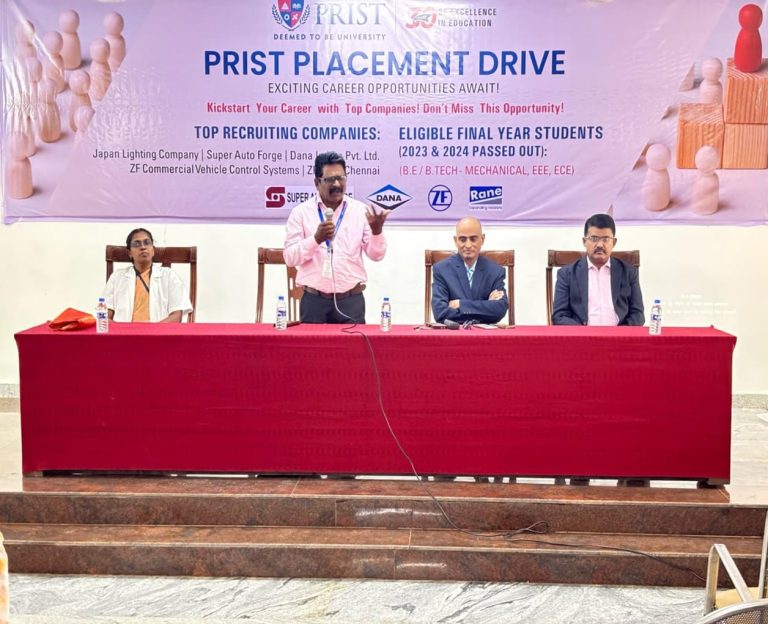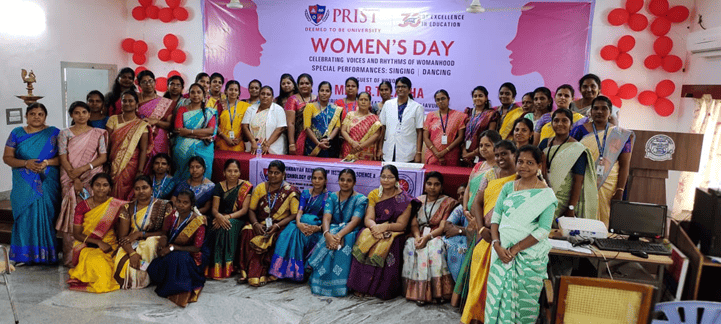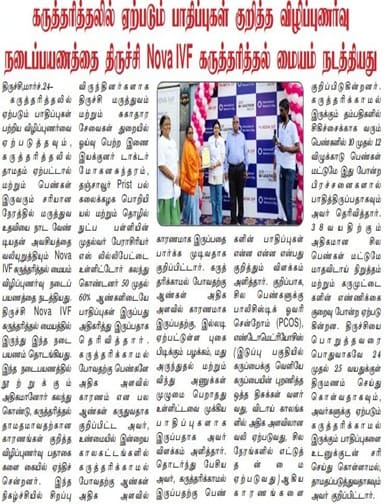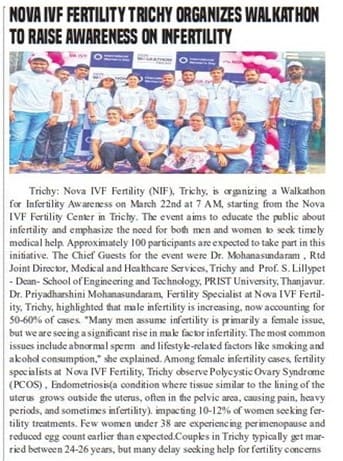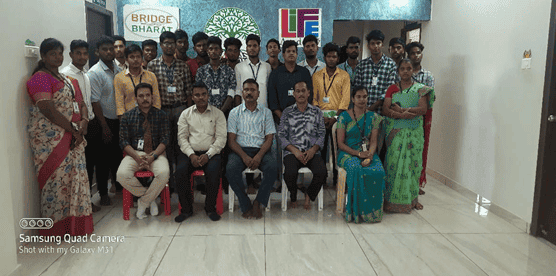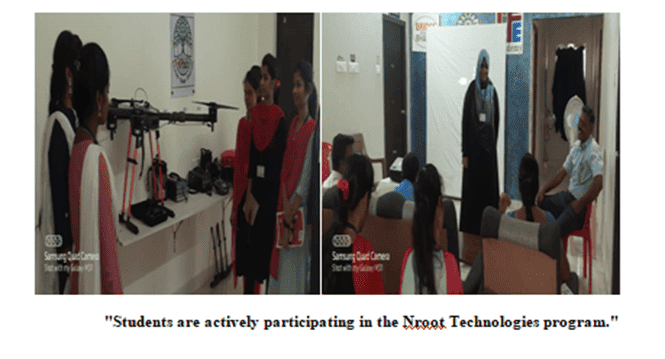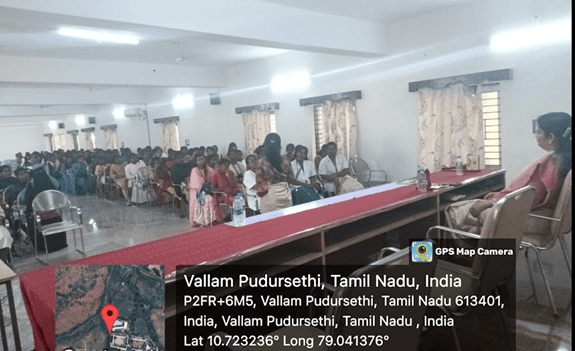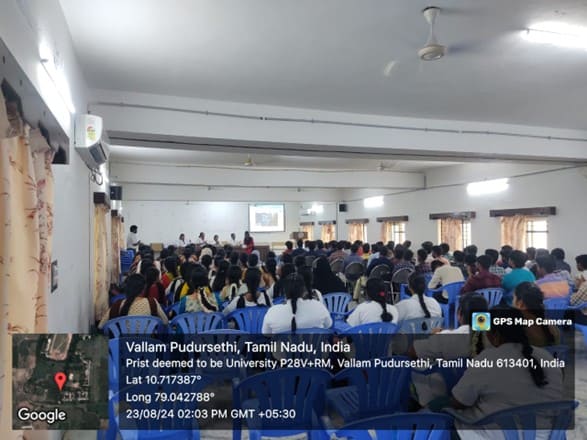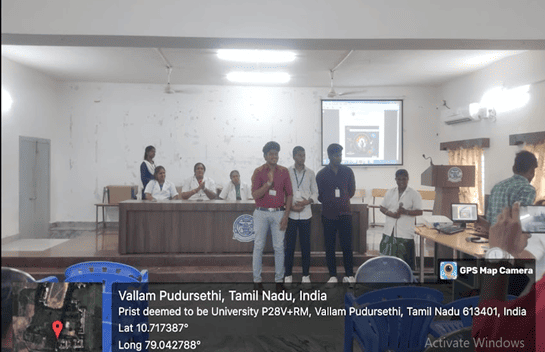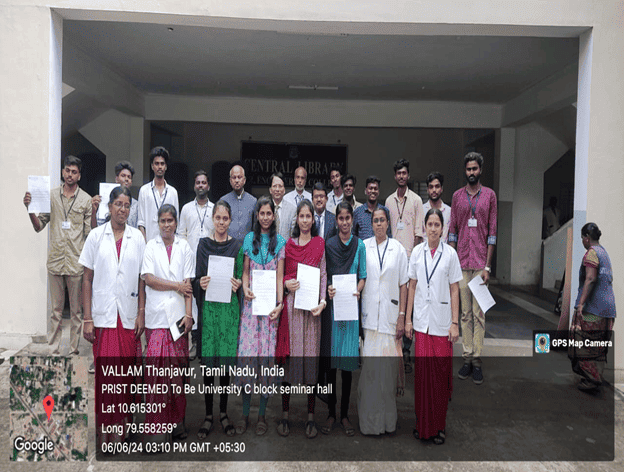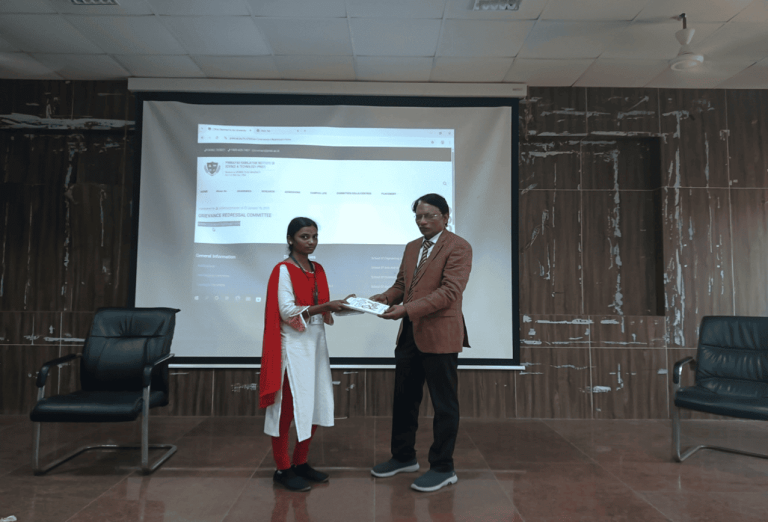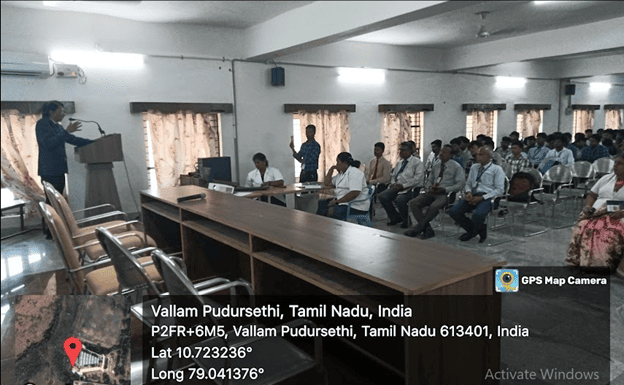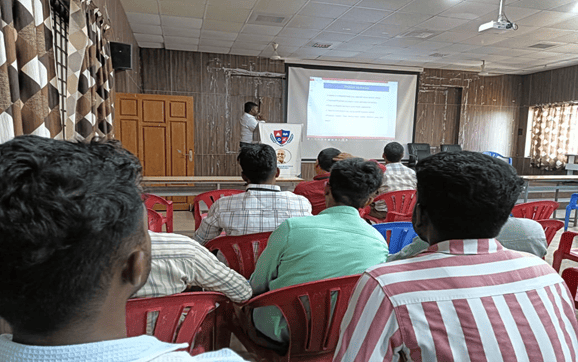The department of Electronics and Communication Engineering came into existence in 2008 with an objective to impart quality education to meet today’s competitive environment. The department has well experienced and dedicated faculty with a strong commitment to provide a vibrant learning environment to the students in order to help them excel. To keep pace with the current technological trends, the department has a well-designed, constantly reviewed syllabus to incorporate all advancements in existing and emerging technologies which gives the students a holistic and pragmatic view of the present scenario of industry. The Department has state-of-the-art laboratories, such as VLSI Lab, Digital Image Processing Lab, Circuit Simulation Lab, Communication Lab, and higher end software like MATLAB, PSPICE, Xilinx, IAR,L-Sim & N-Sim. The Department runs an undergraduate course in B.Tech – Electronics and Communication Engineering and a postgraduate programme viz. M.Tech in Communication Systems. The Department also offers part-time programmes in B.Tech – Electronics and Communication Engineering and M.Tech – Communication Systems.
VISION
To facilitate young Engineers to acquire technical exposure in the areas of ECE.
To provide world class Education, nurture career improvement and develop human and social intellectual qualities.
MISSION
To adopt pedagogical processes.
To build a team of competent teachers.
To develop research and collaborative research with leading organizations.
To provide latest technologies as methodologies.
PROGRAMMES OFFERED
S. NO | COURSES | REGULATION |
1. | B. Tech. (ECE) | FULL TIME |
2. | B. Tech. (ECE) | PART TIME |
3. | M. Tech. (Communication Systems) | FULL TIME |
4. | M. Tech. (Communication Systems) | PART TIME |
5. | Ph. D. | – |
Electronics and Communication Engineering
PROGRAM OUTCOMES (POs)
PO1 | Engineering knowledge: Apply the knowledge of mathematics, science, engineering fundamentals, and an engineering specialization to the solution of complex engineering problems |
PO2 | Problem analysis: Identify, formulate, review research literature, and analyse complex engineering problems reaching substantiated conclusions using first principles of mathematics, natural sciences, and engineering sciences |
PO3 | Design/development of solutions: Design solutions for complex engineering problems and design system components or processes that meet the specified needs with appropriate consideration for the public health and safety, and the cultural, societal, and environmental considerations |
PO4 | Conduct investigations of complex problems: Use research-based knowledge and research methods including design of experiments, analysis and interpretation of data, and synthesis of the information to provide valid conclusions |
PO5 | Modern tool usage: Create, select, and apply appropriate techniques, resources, and modern engineering and IT tools including prediction and modelling to complex engineering activities with an understanding of the limitations |
PO6 | The engineer and society: Apply reasoning informed by the contextual knowledge to assess societal, health, safety, legal and cultural issues and the consequent responsibilities relevant to the professional engineering practice |
PO7 | Environment and sustainability: Understand the impact of the professional engineering solutions in societal and environmental contexts, and demonstrate the knowledge of, and need for sustainable development |
PO8 | Ethics: Apply ethical principles and commit to professional ethics and responsibilities and norms of the engineering practice |
PO9 | Individual and team work: Function effectively as an individual, and as a member or leader in diverse teams, and in multidisciplinary settings |
PO10 | Communication: Communicate effectively on complex engineering activities with the engineering community and with society at large, such as, being able to comprehend and write effective reports and design documentation, make effective presentations, and give and receive clear instructions |
PO11 | Project management and finance: Demonstrate knowledge and understanding of the engineering and management principles and apply these to one’s own work, as a member and leader in a team, to manage projects and in multidisciplinary environments |
PO12 | Life-long learning: Recognize the need for, and have the preparation and ability to engage in independent and life-long learning in the broadest context of technological change |
Programme Educational Objectives:
- PEO1: To enable graduates to pursue research, or have a successful career in academia or industries associated with Electronics and Communication Engineering, or as entrepreneurs.
- PEO2: To provide students with strong foundational concepts and also advanced techniques and tools in order to enable them to build solutions or systems of varying complexity
- PEO3: To prepare students to critically analyse existing literature in an area of specialization and ethically develop innovative and research oriented methodologies to solve the problems identified.
Value Added Courses Introduced (Certificate Courses):
2024-2025:
- Embedded -Raspberry Pi
- Network Design
- Deep Learning Using MATLAB
- Ethical hacking
- Data visualization and machine learning using python
- Design thinking
2023-2024:
- Embedded using Raspberry Pi
- Network Design
- Introduction to Microcontroller
- Introduction to R Programming
- Introduction to Lab view
2022-2023:
- Introduction to Microcontroller
- Introduction to R Programming
- Introduction to Lab view
- Mobile Phone Technology
- PCB Design
- Introduction to SCI Lab Programming
- PLC and SCADA
2021-2022:
- Lora and Lora WAN Communication
- Introduction to Visual Basic Laboratory- Scilab Programming
- Embedded System Interfacing with Robotics
- Machine Learning Techniques
- Antenna Design
- PCB Design
- PLC & SCADA
2020-2021:
- Embedded System Interfacing with Arduino
- Multimedia Laboratory
- Case Study -Network Design
- Embedded Systems Design Using ARM LPC2148
- Antenna Design
- PCB Design
- Introduction to Sci Lab Programming
2019-2020:
- Design of Embedded And Real Time Systems
- Robotics and Its Application
- Internet of Things with Node MCU
- PCB Design and Fabrication
- Antenna Design
- Introduction to Scilab Programming
- PLC & SCADA
2018-2019:
- Antenna Design
- PCB Design
- Introduction to Sci Lab Programming
- PLC & SCADA
- VLSI Design
- Learning C Program
- IC Test Engineering
FACULTY
S. NO | NAME OF THE FACULTY | DESIGNATION | QUALIFICATION |
1) | Dr. M.M.PRASAD REDDY | PROFESSOR, Head of the Department | M. E., Ph. D. |
2) | Dr. SMITHA ELSA PETER | PROFESSOR | M.E., Ph. D. |
3) | Dr. NAGARAJAN. G | ASSOCIATE PROFESSOR | M. Tech., Ph. D. |
4) | Dr. E. VINOTH | ASSOCIATE PROFESSOR | M. E., Ph. D. |
5) | Dr. SUDHARSAN.V | ASSOCIATE PROFESSOR | M. Tech., Ph. D. |
6) | Dr. S. YUVARAJ | ASSOCIATE PROFESSOR | M. Tech., Ph. D. |
7) | Dr. VAKATI SREEKANTH | ASSISTANT PROFESSOR | M. Tech., Ph. D. |
8) | M. MUNI REDDY | ASSISTANT PROFESSOR | M. Tech. |
9) | S. LILLYPET | ASSISTANT PROFESSOR | M.E. |
10) | T DIVYA MANOHARI | ASSISTANT PROFESSOR | M. Tech. |
11) | E. PRIYADHARSHINI | ASSISTANT PROFESSOR | M.E. |
12) | R. SAVITHA | ASSISTANT PROFESSOR | M.E. |
13) | M.SOUNDHARYA | ASSISTANT PROFESSOR | M.E. |
14) | G. GAYATHRI | ASSISTANT PROFESSOR | M.E. |
15) | S. KARTHIK | ASSISTANT PROFESSOR | M.E. |
16) | M TAMILVANAN | ASSISTANT PROFESSOR | M. Tech. |
GRADUATES ATTRIBUTES (GAS)
- Engineering Knowledge: Apply knowledge of mathematics, science, engineering fundamentals and an engineering specialization to the solution of complex engineering problems.
- Problem Analysis: Identify, formulate, research literature and analyse complex engineering problems reaching substantiated conclusions using first principles of mathematics, natural sciences and engineering sciences.
- Design/ Development of Solutions: Design solutions for complex engineering problems and design system components or processes that meet specified needs with appropriate consideration for public health and safety, cultural, societal and environmental considerations.
- Conduct investigations of complex problems using research-based knowledge and research methods including design of experiments, analysis and interpretation of data and synthesis of information to provide valid conclusions.
- Modern Tool Usage: Create, select and apply appropriate techniques, resources and modern engineering and IT tools including prediction and modelling to complex engineering activities with an understanding of the limitations.
- The Engineer and Society: Apply reasoning informed by contextual knowledge to assess societal, health, safety, legal and cultural issues and the consequent responsibilities relevant to professional engineering practice.
- Environment and Sustainability: Understand the impact of professional engineering solutions in societal and environmental contexts and demonstrate knowledge of and need for sustainable development.
- Ethics: Apply ethical principles and commit to professional ethics and responsibilities and norms of engineering practice.
- Individual and Team Work: Function effectively as an individual, and as a member or leader in diverse teams and in multi-disciplinary settings.
- Communication: Communicate effectively on complex engineering activities with the engineering community and with society at large, such as being able to comprehend and write effective reports and design documentation, make effective presentations and give and receive clear instructions.
- Project Management and Finance: Demonstrate knowledge and understanding of engineering and management principles and apply these to one’s own work, as a member and leader in a team, to manage projects and in multidisciplinary environments.
- Life-long Learning: Recognize the need for and have the preparation and ability to Engage in independent and life- long learning in the broadest context of technological Change.
SOME RECENT PUBLICATIONS :
- C. Jayanth; Smitha Elsa Peter; B. Santhosh; V. L. Nandhini (2024), ‘Design of multiparameter fiber Bragg grating in optical transmission systems wavelength division multiplexing’, Journal of Optics, ISSN: 0972-8821, e-ISSN: 0974-6900.
- Jayanth C; Smitha Elsa Peter; Santhosh B. (2023), ‘Optical Triplexer and Diplexer Filter Using Two-Dimensional Photonic Crystal’, Journal of Optics, Vol. 53, Iss. 3, ISSN: 0972-8821, e-ISSN: 0974-6900, pp. 2331-2338.
- Bharathi Ramachandra, Smitha Elsa Peter (2023), ‘Secured authentication of radio-frequency identification system using PRESENT block cipher’, International Journal of Electrical and Computer Engineering (IJECE), Vol. 13, Iss. 5, ISSN: 2088-8708, pp. 5462-5471. (SCOPUS indexed)
- Dr. A. Rijuvana Begum (2022), ‘Hybridization of Metaheuristics based Unequal Clustering for Energy Aware Data Aggregation Technique in Wireless Sensor Networks’, Indian Journal of Computer Science and Engineering, 13 (2), 388 – 397. ISSN: 0976-5166.
- R. Bharathi, N. Parvatham (2022), ‘Light-Weight Present Block Cipher Model for IoT Security on FPGA’, Intelligent Automation & Soft Computing, 33(1) , pp. 35-49.
- K Kalpana, Dr. Smitha Elsa Peter (2021), ‘A Real Time IOT based Vehicle Surveillance Tracking, Facial Recognition Anti-Theft& Exhaust Gases Monitoring System’, International Research Journal of Engineering and Technology (IRJET), Vol. 8, Iss 7, e-ISSN: 2395-0056, p-ISSN: 2395-0072, pp. 3412 – 3419.
- Rajinikanth C. (2021), ‘Energy Efficient Cluster Based Clinical Decision Support System in IoT Environment,’ Computers Materials & Continua (CMC), 69(2), 2013 – 2029.
- A. Rijuvana Begum (2021), ‘Enhancement Approach On Channel Equalization Using Robust And Adaptive Random Forest Learning Approach’, International Journal of Advanced Research in Engineering and Technology (IJARET), 12(2), 731-742.
- Rajinikanth, C. (2020), ‘Unconstrained Global Optimization Based Partial Transmit Sequence for OFDM PAPR Reduction’. International Journal of Advanced Science and Technology (IJAST), 29(3), 7346-7354.
- A. Rijuvana Begum (2020), ‘Social spider-based unequal clustering protocol for wireless sensor environment for smart cities’, Electronic Government, an International Journal, 16 (1-2), 190-209
- A. Rijuvana Begum, Smitha Elsa Peter (2020), ‘Smart LED Notice Board using Bluetooth Device’, Journal of Emerging Technologies and Innovative Research (JETIR), 7(6), 1571 – 1574.
- Arumugam K., A. Rijuvana Begum, Smitha Elsa Peter (2020), ‘Smart LED Notice Board using Bluetooth Device’, Journal of Emerging Technologies and Innovative Research (JETIR), Vol. 7, Iss 6, ISSN: 2349-5162, pp. 1571 – 1574.
- Bharathi R, N. Parvatham (2020), ‘LEA-SIoT: Hardware Architecture of Lightweight Encryption Algorithm for Secure IoT on FPGA Platform’, International Journal of Advanced Computer Science and Applications, (IJACSA), Vol. 11, Iss. 1 , pp. 720-725.
- Bharathi R, N. Parvatham (2020), ‘Hardware-Based Physical Layer Security Solutions and Algorithms for IOT Devices on FPGA Platform’, International Journal of Innovative Technology and Exploring Engineering (IJITEE), Vol. 9 Iss. 3, pp. 2128-2132, ISSN: 2278-3075 (Online).
- M. Shanthipriya, Smitha Elsa Peter (2019), ‘Avoidance of Traffic Congestion In Regional Transport Office’, International Journal of Computer Sciences and Engineering (JCSE), Vol. 7, Iss 1, E-ISSN: 2347-2693,pp. 894-898.
- Rajinikanth, C. (2019), ‘An Unsupervised Learning of Hyperspectral Images using Fuzzy C-means (FCM) Clustering Method with Glowworm Swarm Optimization (GSO)’. Advanced Materials Proceedings, 4(4), 151-154.
- Sebastian, K., & Devi, S. (2019), ‘A novel model of feature extraction for lung cysts detection in CT image using Minutiae based Mumford and Shah functional model’, Australian Journal of Electrical and Electronics Engineering (AJEEE), 16(4), 345-356
- Sowmya. S, Smitha Elsa Peter, S. Devi, A. Rijuvana Begum, A. Sujatha Priyadharshini (2018), ‘Design and Implementation of Invisible Border Alert System in Military Field’, International Journal of Pure and Applied Mathematics (IJPAM) Vol. 119, Iss 16, ISSN: 1314-3395 (on-line version) Special Issue, pp. 3987-3995.
- S.M. Sivakama Sundari, A. Sujatha Priyadharsini, S. Devi, A. Rijuvana Begum, Smitha Elsa Peter (2018), ‘VLSI Based Dynamic Reconfiguration of Arithmetic Units of VideoEncoding’, International Journal of Pure and Applied Mathematics (IJPAM) Vol. 119, Iss 16, ISSN: 1314-3395 (on-line version) Special Issue, pp. 3981-3986.
- Sembaruthi. S, Dr. S. Devi, Dr. Smitha Peter Elsa (2018), ‘IOT Based Real Time On Site Agricultural System’, International Journal of Pure and Applied Mathematics (IJPAM) Vol. 119, Iss 16, ISSN: 1314-3395 (on-line version) Special Issue, pp. 3969-3973.
- Smitha Elsa Peter, S. Devi, A. Rijuvana Begum, A. Sujatha Priyadharshini (2018), ‘Design and Implementation of Invisible Border Alert System in Military Field’, International Journal of Pure and Applied Mathematics (IJPAM), 119(16), 3987-3995
- J. Vinoth Kumar, Smitha Elsa Peter (2017), ‘Accurate Fuel Level Finder for Filling and Tank Left Over Fuel Using Sensors’, International Journal of Latest Research in Engineering and Technology (IJLRET), Vol. 3, Iss. 11, ISSN: 2454-5031, pp. 01 – 10.
- M. Anandraj, A. Rijuvana Begum, Smitha Elsa Peter (2017), ‘Real Time Image Feature Extraction using SIFT Detector’, International Research Journal of Engineering and Technology (IRJET), Vol. 4, Iss. 4, e-ISSN: 2395–0056, p-ISSN: 2395-0072, pp. 1 – 5.
- Manirafasha Cedrick, A. Sujatha Priyadarshini, Dr. Smitha Elsa Peter (2017), ‘Reliability of RSSI-based Ranging Technique in WSN’, International Journal of Engineering Research-Online (IJOER), Vol. 5, Iss. 1, ISSN: 2321-7758, pp. 187 – 190.
- P. Suganya, Smitha Elsa Peter (2016), ‘Driver Activity Analysis for Intelligent Vehicles’, International Journal of Research Science and Engineering (IJRSE), Vol. 1, Iss. 1, pp. 1-6.
- Smitha Elsa Peter, I. Jacob Raglend (2016), ‘Sequential wavelet-ANN with embedded ANN-PSO hybrid electricity price forecasting model for Indian energy exchange’, Neural Computing and Applications (NCAA), Springer Publisher, Vol. 27, No. 1, pp. 1-16. ISSN: 0941-0643, eISSN: 1433-3058. DOI:10.1007/s00521-015-2141-3, [Impact Factor (2014) – 1.569, h5 index – 122]
- M. Tawhidha, A. Rijuvana Begum, S. Balakrishnan, Smitha Elsa Peter, A. Sujatha Priyadharshini, K.Vinoth (2015), ‘Design and Simulation of Seven Level Cascaded H-Bridge Quasi Z Source Multilevel Inverter for Solar PV System’, SSRG International Journal of Communication and Media Science (SSRG-IJCMS), Vol. 2, Iss. 5, pp. 1-6.
- Smitha Elsa Peter, I. Jacob Raglend (2014), ‘Short Term Forecasting of Market Clearing Price in Indian Energy Exchange using ANN-ANN-PSO Model’, International Journal of Electrical and Electric Engineering & Telecommunications, Vol. 3, Iss. 3, pp. 82-95. ISSN: 2319-2518.
- Smitha Elsa Peter, I. Jacob Raglend, S. P. Simon (2014), ‘An Architectural Frame Work of ANN based Short Term Electricity Price Forecast Engine for Indian Energy Exchange using Similar Day Approach’, IMPACT: International Journal of Research in Engineering & Technology (IJRET), Vol. 2, Iss. 4, pp. 111-122. ISSN (Print): 2347-4599, ISSN (Online): 2321-8843.
- Smitha Elsa Peter, Santosh Kulkarni, I. Jacob Raglend, Sishaj P. Simon (2013), ‘Wavelet Based Spike Propagation Neural Network (WSPNN) for Wind Power Forecasting’, International Review on Modelling and Simulation (I.RE.MO.S.), Praise Worthy Publications, Vol. 6, No. 5, pp.1513-1522. ISSN:1974-9821, eISSN: 2533-1701.
PATENTS
S.No. | INVENTOR(S) &PATENT TITLE | APPLICATION NUMBER& DATE FILLED | FILED(F) /PUBLISHED(P) /GRANTED(G) |
1. | Dr. P. Geetha, Dr. J. Jeyarani, Dr. Akanksha Gupta, Dr. Smitha Elsa Peter, R. Deepalakshmi & Hollowed Pentagon Model Patch Antenna | 202341014337 & 24/03/2023 | Published |
2. | Dr.P.Geetha, Dr.Smitha Elsa Peter, Dr.C.Rajinikanth & Pill Dispenser | 371237-001 & 2022 | Granted |
3. | Dr. N. Parvatham & Design and Fabrication of Low Cost Breath Monitoring System using Arduino UNO in IOT Platform | 202141008418 & 12.03.2021 | Published |
4. | Dr. N. Parvatham & Development of High Performance Harmless Cooling System of Refrigeration Plant using Terracotta | 201841022934 A & 29.06.2018 | Published |
5. | Dr. S. Devi, A. Rijuvana Begum & Implementation of Smart Theft Control System for Vehicle Security and Abstention of Car Accidents | 201741013082 A & 2017 | Published |
SEED MONEY GRANTED BY PRIST:
S.No. | PROJECT TITLE | FACULTY | GRANT IN Rs. |
1. | Wireless sensor networks screening via data aggregation process method | Dr.C.Rajinikanth | 4.8 |
2. | Developmental methods extraction and support vector machine base content-based image retrieval for medical application | Dr.C.Rajinikanth | 4.5 |
3. | Image assisted machine learning algorithm for early diagnosis of disease detection in lung CT images | Dr.A.Rijuvana Begum | 7.4 |
4. | Smart Street Lighting Solutions: IoT Integration for Energy Efficiency and Safety | Mrs.T. Divya Manohari | 12.42 |
5. | Lighting Simulation and Photometric Analysis for Floodlighting Projects | Dr. Smitha Elsa Peter | 10.58 |
6. | Digital Marketing Consultancy: SEO, SEM, and Social Media Strategies | Mrs.T. Divya Manohari | 2.20 |
7. | Digital Transformation in Cargo Management: IoT, Blockchain, and Automation | Mrs.S.Lillypet | 2.40 |
8. | Real time implementation of wireless infant health monitoring system | Mrs. A. Aarthi | 2.20 |
9. | Design and implementation of warehouse management system using internet of things | Dr. Smitha Elsa Peter | 1.80 |
10. | Automatic bomb diffusion strategy implementation using zigbee communication | Dr. Smitha Elsa Peter | 2.90 |
11. | Iot based smart wireless charging of electric vehicles | Dr. P. Geetha | 1.90 |
12. | Agri werehouse based intelligent harvested grains protection system using zigbee module | Mr. S. Maheshwaran | 1.50 |
13. | Laser touch based voice transmitter and receiver | Dr. A. Rijuvana Begum | 2.20 |
14. | Accident information system using GPS, GSM sensor | Dr. A. Rijuvana Begum | 2.70 |
15. | Decentralized smart phone based traffic information system | Dr.C.Rajinikanth | 1.70 |
16. | Sending SMS with speech recognition interface | Dr.C.Rajinikanth | 2.10 |
17. | Microcontroller based substation monitoring and controlling system | Dr. Smitha Elsa Peter | 1.30 |
18. | Vehicle to vehicle communication protocol for co-operative collision | Dr. Smitha Elsa Peter | 2.00 |
19. | Advanced helmets for bikers for security measure | Dr. N. Parvatham | 2.20 |
20. | Vehicle ignition locking system using fingerprint with GSM module | Mrs.T.Divya Manohari | 1.30 |
21. | Innovative Technologies in Cargo Tracking and Real-Time Shipment Monitoring | Dr. Smitha Elsa Peter | 0.50 |
CONSULTANCY:
S.No. | PROJECT TITLE | FACULTY | SPONSORING AGENCY |
1. | User Experience Enhancement and Interface Design for Media Automation Tools | Dr. S. Devi | AMBC Technologies |
2. | LABVIEW – DC Motor Speed Control Using LABVIEW | Mrs.P.Geetha | ACME Systems |
3. | PCB Design for Analog to Digital Converter Circuit | Mrs.Amudha | Pantech Solutions |
4. | MATLAB Coding for Visualizing FourDimensional Data | Dr.N.Parvatham | Trible Infotech |
5. | Wireless Power Transfer Stability Analysis for E-Vehicle Application | Dr. A.Rijuvana Begum | Pantech Solutions |
6. | Programming of PLC & SCADA | Dr. A.Rijuvana Begum | I-Max Industrial Automation Technologies |
7. | Structural Design, Mix Design & Working Drawing | Dr..S.Devi | GJ Constructions |
8. | Development of an loT-Based Smart Building Management System for Energy Efficiency and Safety | Dr. Smitha Elsa Peter | GJ Constructions |
9. | Smart Traffic Management System Using Embedded Systems and Wireless Sensor Neh.vorks | Dr.S.Audithan | Pantech Solutions |
SPONSORED RESEARCH PROJECTS:
S.No. | PROJECT TITLE | FACULTY | SPONSORING AGENCY |
1. | Smart Street Lighting Solutions: IoT Integration for Energy Efficiency and Safety | Mrs.T. Divya Manohari | Suhas Engineering |
2. | Lighting Simulation and Photometric Analysis for Floodlighting Projects | Dr. Smitha Elsa Peter | Suhas Engineering |
3. | Digital Marketing Consultancy: SEO, SEM, and Social Media Strategies | Mrs.T. Divya Manohari | NPC Org Pvt Ltd |
4. | Digital Transformation in Cargo Management: IoT, Blockchain, and Automation | Mrs.S.Lillypet | Uni Link Cargo |
5. | Real time implementation of wireless infant health monitoring system | Mrs. A. Aarthi | Sri Ponnaiyah Ramajayathammal Educational and Charitable Trust |
6. | Design and implementation of warehouse management system using internet of things | Dr. Smitha Elsa Peter | Sri Ponnaiyah Ramajayathammal Educational and Charitable Trust |
7. | Automatic bomb diffusion strategy implementation using zigbee communication | Dr. Smitha Elsa Peter | Sri Ponnaiyah Ramajayathammal Educational and Charitable Trust |
8. | Iot based smart wireless charging of electric vehicles | Dr. P. Geetha | Sri Ponnaiyah Ramajayathammal Educational and Charitable Trust |
9. | Agri werehouse based intelligent harvested grains protection system using zigbee module | Mr. S. Maheshwaran | Sri Ponnaiyah Ramajayathammal Educational and Charitable Trust |
10. | Laser touch based voice transmitter and receiver | Dr. A. Rijuvana Begum | Sri Ponnaiyah Ramajayathammal Educational and Charitable Trust |
11. | Accident information system using GPS, GSM sensor | Dr. A. Rijuvana Begum | Sri Ponnaiyah Ramajayathammal Educational and Charitable Trust |
12. | Decentralized smart phone based traffic information system | Dr.C.Rajinikanth | Sri Ponnaiyah Ramajayathammal Educational and Charitable Trust |
13. | Sending SMS with speech recognition interface | Dr.C.Rajinikanth | Sri Ponnaiyah Ramajayathammal Educational and Charitable Trust |
14. | Microcontroller based substation monitoring and controlling system | Dr. Smitha Elsa Peter | Sri Ponnaiyah Ramajayathammal Educational and Charitable Trust |
15. | Vehicle to vehicle communication protocol for co-operative collision | Dr. Smitha Elsa Peter | Sri Ponnaiyah Ramajayathammal Educational and Charitable Trust |
16. | Advanced helmets for bikers for security measure | Dr. N. Parvatham | Sri Ponnaiyah Ramajayathammal Educational and Charitable Trust |
17. | Vehicle ignition locking system using fingerprint with GSM module | Mrs.T.Divya Manohari | Sri Ponnaiyah Ramajayathammal Educational and Charitable Trust |
18. | Innovative Technologies in Cargo Tracking and Real-Time Shipment Monitoring | Dr. Smitha Elsa Peter | Uni Link Cargo |
- Industry Institution Interaction Cell Conducted ‘Best Innovative Project Award’ scrutiny on 24.05.2019 for the year 2019. Read More
- Prof.S. Lillypet of ECE Department was identified as “Distinguished women academician” and awarded by Research Education Solution, New Delhi in association with Institute Of Management ,Bhubaneshwar . Read more
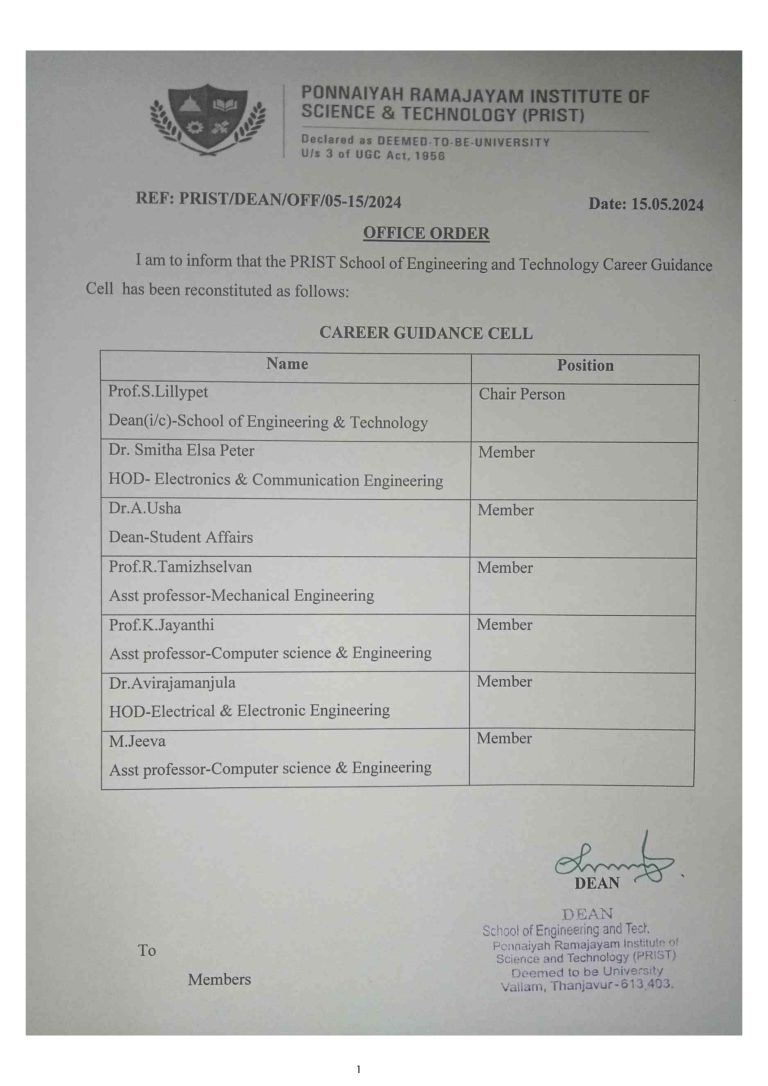
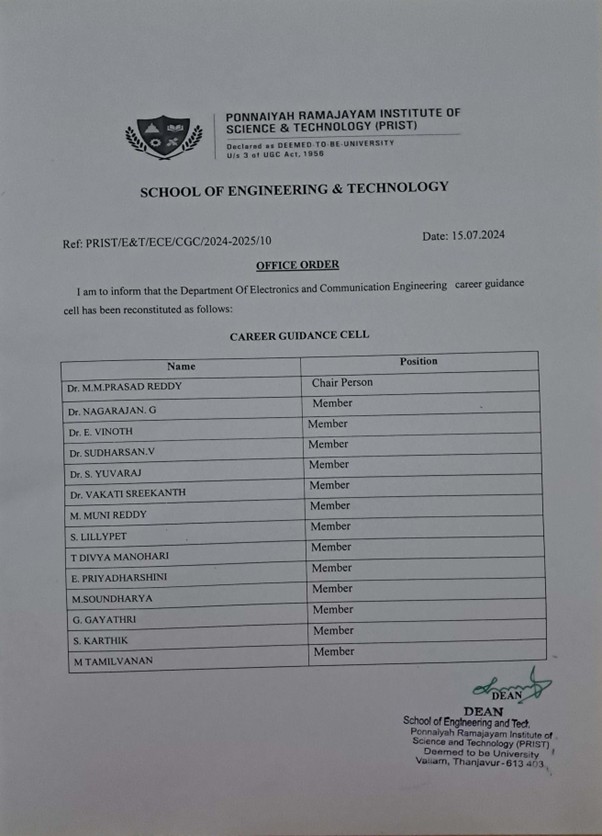
- META club activity – 09.04.2024
Our ECE department conducted an activity on 9.4.2025 through our META club. The theme of the event is “World Health Day”, which is commemorated on April 7th every year. As a part of event, our ECE department organized the following activities.
- Speech competition (Theme: Health & Hygiene)
- Quiz (World Health Day). Read more…
- Department of ECE, conducted the PRIST Placement training program in the PRIST Block On 14.03.2025. Read more…
- Soft skill program on 24.03.2025
The Department of Electronics and Communication Engineering is organizing a soft skills program on 24th March 2025. Our esteemed CEO will be delivering valuable insights on skill development. Read more….
- Carrier counseling program on 14.02.2025
The Department of Electronics and Communication Engineering is conducting a career counseling program for group discussions in interviews on 14th February 2025. Mr. B. Saravana Kumar from Periyar Maniyammai University will be the speaker. Read more…
- Competitive Examination Guidance Programme on 11.10.2024
As per activity plan an event was organized along with Mr. V. Guhanantham, Navigational Assistant/Station in-charge from Ministry of Port, shipping & waterways Government of India on 11.10.2024. Read more…..
- Language and communication skill program on 23.08.2024
“The Department of Electronics and Communication Engineering conducted a Language & Communication Skills Programme on 23rd August 2024. Our esteemed Dean, Mrs. S. Lillypet, delivered an inspiring speech on the importance of active listening.” Read more….
Competitive Examination Guidance Programme: Approach Methodology for GATE Examination held on 15th December 2024, organized by the Department of ECE.
Career Development Programme: Awareness Program on “Job Opportunities in PCB and IoT Designing Industries” held on 12th December 2024, organized by the Department of ECE.
Language & Communication Skills Programme: Group Discussion on “Teamwork” held on 5th December 2024, organized by the Department of ECE.
Life Skills Programme: Staff Speech on “Facing Interviews” held on 1st October 2024, organized by the Department of ECE.
Soft Skills Programme: “Event to Impact – Creativity” held on 24th September 2024, organized by the Department of ECE.
Technical Fest Programme: “National Space Day 2024” held on 23rd August 2024, organized by the Department of ECE.
Awareness of Trends & Technologies Programme: One-Day Workshop on “Neural Networks as a Boon” held on 23rd September 2023, organized by the Department of ECE.
Cultural Programme: “TRONIXTECHS’2024” held on 20th September 2024, organized by the Department of ECE.
Academic Fest Programme: “BYTE BLAST-24” held on 5th September 2024, organized by the Department of ECE.
Club Activities (Dr. APJ Abdul Kalam Club): “Remembering Dr. APJ Abdul Kalam” held on 27th July 2024, organized by the Department of ECE.
Career Development Programme: Awareness Program on “Career Guidance – Scope of Engineers in Army and Navy” held on 3rd May 2024, organized by the Department of ECE.
Competitive Examination Guidance Programme: Approach Methodology for IES Examination held on 30th April 2024, organized by the Department of ECE.
Cultural Programme: “ELEKTTRONIKA 2024” held on 8th April 2024, organized by the Department of ECE. Read more…
Soft Skills Programme: “Event to Impact – Critical Thinking” held on 4th April 2024, organized by the Department of ECE.
Life Skills Programme: Student Speech on “Preparation for University Exams” held on 2nd April 2024, organized by the Department of ECE.
Awareness of Trends & Technologies Programme: Guest Lecture on “AI and Machine Learning” held on 30th March 2024, organized by the Department of ECE.
Technical Fest Programme: “KRATORQ’24 – Paper Presentation” held on 7th March 2024, organized by the Department of Management.
Academic Fest Programme: “Mini Project Expo-2024” held on 16th February 2024, organized by the Department of ECE.
Club Activities (Vivekananda Club): “Celebrating Swami Vivekananda – Motivating Youth Towards Nation’s Progress” held on 22nd January 2024, organized by the Department of ECE.
Competitive Examination Guidance Programme: Approach Methodology for GATE Examination held on 20th December 2023, organized by the Department of ECE.
Language& Communication Skills Programme: Group Discussion on “Time Management” held on 15th November 2023, organized by the Department of ECE.
Language& Communication Skills Programme: Group Discussion on “Time Management” held on 15th November 2023, organized by the Department of ECE.
Language& Communication Skills Programme: Group Discussion on “Time Management” held on 15th November 2023, organized by the Department of ECE.
Life Skills Programme: Student Speech on “Self Motivation” held on 14th November 2023, organized by the Department of ECE.
Career Development Programme: Awareness Program on “Job Opportunities in PCB and IoT Designing Industries” held on 14th November 2023, organized by the Department of ECE.
Life Skills Programme: Student Speech on “Self Motivation” held on 14th November 2023, organized by the Department of ECE.
Career Development Programme: Awareness Program on “Job Opportunities in PCB and IoT Designing Industries” held on 14th November 2023, organized by the Department of ECE.
Soft Skills Programme: Event on “Conflict Resolution” held on 2nd November 2023, organized by the Department of ECE.
Soft Skills Programme: Event on “Conflict Resolution” held on 2nd November 2023, organized by the Department of ECE.
Cultural Programme: Galaxy ’23 held on 31st October 2023, organized by the Department of ECE.
Technical Fest Programme: SPECTRA ’23 held on 10th October 2023, organized by the Department of ECE.
Academic Fest Programme: Workshop on Data Science Using Python Programming held on 27th September 2023, organized by the Department of Management.
Club Activities: Visvesvaraya Club Programme on “Visvesvaraya – Cause for Engineer’s Day” held on 24th September 2023, organized by the Department of ECE.
Club Activities: Visvesvaraya Club Programme on “Visvesvaraya – Cause for Engineer’s Day” held on 24th September 2023, organized by the Department of ECE.
Club Activities: Visvesvaraya Club Programme on “Visvesvaraya – Cause for Engineer’s Day” held on 24th September 2023, organized by the Department of ECE.
Awareness of Trends & Technologies Programme: Online Webinar on “Advanced Technology in Communication” held on 23rd September 2023, organized by the Department of ECE.
Awareness of Trends & Technologies Programme: Online Webinar on “Advanced Technology in Communication” held on 23rd September 2023, organized by the Department of ECE
National Webinar on “Optical Wireless Communication – Challenges & Opportunities” on 17.06.2020 at 11:00 am to 12:00 pm by J. Jeyarani, Associate Professor & Head/ ECE, CARE College of Engineering, Tiruchirapalli
Project Expo 2K20 on 11-03-20
Arduino Workshop on 08-02-20
The Department of ECE authorized and guided a local visit to N-ROOT Consultancy. N-root Technologies Private Limited is an Indian private company incorporated on 25/07/2019.Read more…
Seminar on Check for Plag on 15-09-19 by Dr.N.Parvatham, Prof / ECE, PRIST Deemed to be University
VIDHYUT 2K19 – National Level Technical Symposium by Mr. Sundaresan. N, Drone developer, Aerostat Drones, Thanjavur on 12-09-19
Seminar on Speech Processing by Mr. Dharmalingam, HOD, Dept of ECE, Kongunadu Engineering College, Namakkal on 29.08.19
Guest Lecture on GSM Operations in Mobile Communications by Mr. A. Arul Mohan, Director, AGB Infratel Pvt. Ltd., Chennai on 23-07-19
Guest Lecture on Corporate Skills for Engineers by Dr T. T. M. Kannan, Scientist, CRD, PRIST Deemed to be University on 19.07.19
Workshop on Skill Development Programme on Mind Excellence Towards Research by Centre for Knowledge Management and Centre for Skill Development, PRIST Deemed to be University on 26.06.2019.
Conducted webinar on “Artificial Intelligence” by Mrs. A. Jancy Rani M.tech (Asst. Prof, Dept of AI&ML, Dr.T.Thimmaiah Institute of Technology, Kolar Gold Field, Karnataka) on 24.8.2023.
Conducted workshop on “Data science using Python programming” by Mrs. Jenifer & S. Rubini from Microsoft certified Software trainers of I-Sysways Technologies, Thanjavur on 27.9.2023.
Four students attended One day workshop on “Recent Trends in Electrical Engineering” at Kings College of Engineering, Pudukkottai, on 4.10.2023.
2nd, 3rd and Final Year Students were taken for a visit to nRoot Technologies, Mapillainayakkanpatti, Near Airforce Station, Thanjavur on 11.10.2023.
Conducted Seminar on “LTE Mobile Communication and RF Drive test” by Mr.Jyothivelu, Subdivision Engineer, BSNL, Trichy on 9.5.22.
Students participated in Paper presentation in TechFest organized by our college on 20.10.2022.
Three students participated in Paper presentation conducted by Arasu Engineering College, Kumbakonam, Thanjavur District.
Two students of 2022 batch got placed in TCS
Head, Department of Electronics and Communication Engineering, School of Engineering & Technology,
PRIST Deemed to be University, Vallam, Thanjavur – 613403.
Email:
hodece@prist.ac.in
Phone:
04362-265021

